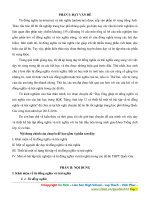unit 14 recreation tiếng anh 11 phạm văn phương thư viện giáo án điện tử
Bạn đang xem bản rút gọn của tài liệu. Xem và tải ngay bản đầy đủ của tài liệu tại đây (132.79 KB, 20 trang )
<span class='text_page_counter'>(1)</span><div class='page_container' data-page=1>
<b>CF161a</b> CF 161
Date: ngày tháng
Time: giờ phút ~ giờ phút
Name: ______________________
<b>UNIT 14: RECREATION</b>
<b>A. Pronunciation</b>
<b>Choose the word that has the underlined part </b>
<b>pronounced differently from that of the others</b>
1. a. sits b. reads c. stops d. walks
2. a. watched b. missed
c. replaced d. managed
3. a. sport b. course c. walk d. world
4. a. leisure b. song c. saying d. seat
5. a. agreed b. organized
c. based d. armed
</div>
<span class='text_page_counter'>(2)</span><div class='page_container' data-page=2>
<b>CF161b</b>
<b>B. Conjunction </b><i><b>(liên từ):</b></i><b> both … and; not only … but</b>
<b>also; either … or; neither … nor</b>
<b>1. Both … and</b> (<i>vừa … vừa</i>)
“<b>both … and”</b> được theo sau bởi những từ hoặc cụm từ cùng loại.
<b> S + V + both + adj / noun… + and + adj /noun…</b>
<i>®</i> <i>He’s both handsome and clever.</i>
<i> adj adj </i>
<i>®</i> <i>Hung spoke to both his sister and Nga.</i>
<i> noun noun</i>
_ <i>The city suffers from air pollution. The city suffers </i>
<i>from water pollution.</i>
<i>®</i> <i>The city suffers from both air pollution and water </i>
<i>pollution</i>.
</div>
<span class='text_page_counter'>(3)</span><div class='page_container' data-page=3>
CF162a CF 162
<b>Combine the sentences using “both … and”</b>
_ <i>The film was very boring. It was very long, too</i>
<i>®</i> <i>The film was very both boring and long.</i>
1. The man is friendly. He is intelligent.
____________________________________
2. Lan is a teacher. She is a singer, too.
____________________________________
3. I lost Lan’s book at my house. I also lost my hat.
____________________________________
4. Lan spoke to her mother. She spoke to her
father, too.
_____________________________________
5. Anna is pretty. She is clever.
<sub></sub>_____________________________________
6. Helen lost her passport at the airport. She also
lost her wallet there.
<sub></sub>_____________________________________
7. Peter’s father is kind. He is generous, too.
</div>
<span class='text_page_counter'>(4)</span><div class='page_container' data-page=4>
<b>CF162b</b>
Hai chủ ngữ nối nhau bởi “<b>both … and</b>” đi với
động từ số nhiều.
<i>_ Both her mother and her sister are here</i>.
<b>Combine the sentences using “both … and”</b>
_ <i>Jim is on holiday and so is Carol.</i>
<i>®</i> <i>Both Jim and Carol are on holiday.</i>
1. Tom was late and so was Anna.
Both __________________________________
2. Nga is reading. Lan is reading.
Both __________________________________
3. Nam bought the blue car. Hoa bought the blue car,
too.
Both __________________________________
4. Bill went to the cinema last night; Jane went to the
cinema last night, too.
Both ___________________________________
5. Mary is in the kitchen now; her sister is in the
kitchen now, too.
</div>
<span class='text_page_counter'>(5)</span><div class='page_container' data-page=5>
CF163a CF 163
<b>2. Neither … nor </b>(<i>không … cũng không</i>)
Khi ta chuyển sang cấu trúc “<b>neither … nor …</b>” là
chuyển đổi hình thức câu phủ định sang câu xác
định.
_ <i>He didn’t smoke and he didn’t drink. </i>
<i> (câu phủ định)</i>
<i>® He neither smoked nor drank. </i>
<i> (hình thức câu xác định)</i>
<b> Chú y</b>ù:
<i>_ Neither John nor his students go on holiday.</i>
<i>_ Neither John nor his wife goes on holiday.</i>
<b>Neither + S1 + nor + S2</b>
<b>Noun1</b> <b> Noun2</b>
<b>Adjective1</b> <b> Adjective2</b>
<b>Adv1</b> <b> Adv2</b>
<b>V</b> <b> V</b>
<b>Neither + S1 + nor + S2 + V(S2)</b>
</div>
<span class='text_page_counter'>(6)</span><div class='page_container' data-page=6>
<b>CF163b</b>
<b>Combine the sentences, using “neither … nor”</b>
_ <i>Bill doesn’t smoke. John doesn’t smoke either.</i>
<i>® Neither Bill nor John smokes.</i>
<i>_ She is not beautiful. She is not intelligent.</i>
<i>®</i> <i>She is neither beautiful nor intelligent.</i>
1. Mary doesn’t study French and Bill doesn’t study
French.
Neither Mary nor Bill_____________________
2. Jim doesn’t have a car and her parents don’t have
a car, either.
Neither Jim nor her parents________________
3. George didn’t watch TV. David didn’t watch,
either.
Neither George nor David_________________
4. Bill didn’t write and he didn’t phone.
Bill neither_____________________________
5. Ann doesn’t eat and she doesn’t drink.
Ann neither_____________________________
6. Ha is not happy. She is not excited.
</div>
<span class='text_page_counter'>(7)</span><div class='page_container' data-page=7>
<b>CF164a</b> CF 164
<b>3. Either … or … </b>(<i>hoặc … hoặc …)</i>
Dùng để nói về sự lựa chọn
_ <i>You can either walk or go by bike.</i>
<b> Chuù yù:</b>
_ <i>Either the students or the teacher is planning to </i>
<i>come.</i>
<i>_ Either the teacher or the students are planning to </i>
<i>come.</i>
<b>Choose the correct answer</b>
_ <i>Neither the teacher nor his students (go / goes) to </i>
<i>the meeting.</i>
1. Neither Lan nor her sons (clean / cleans) the
house.
2. Either the workers or the boss (solve / solves) this
problem.
3. Both Lan and Mai (is / are) happy.
<b>Either + S1 + or + S2</b>
<b>V</b> <b> V</b>
<b>adj</b> <b> adj</b>
<b> Either S1 or S2 + V(S2)</b>
</div>
<span class='text_page_counter'>(8)</span><div class='page_container' data-page=8>
<b>CF164b</b>
<b>4. Not only … but also </b>(<i>không những … mà còn…</i>)
_ <i>She is not only beautiful but also intelligent</i>.
<b>Combine the sentences, using “both…and, neither </b>
<b>… nor, either… or, not only… but also”</b>
_ <i>Tom was late. So was Mary.</i>
<i>® Both Tom and Mary were late.</i>
1. The film was boring. It was long, too.
The film was both________________________
2. Jane doesn’t have a mobile. Carol doesn’t have a
mobile.
Neither Jane____________________________
3. On Sunday, sometimes I go swimming, sometimes
I visit my teacher.
On Sunday, I either______________________
4. Van didn’t clean the floor. She didn’t wash the
clothing, either.
Van neither_____________________________
5. Jane is nice. She is also friendly.
Jane is not only__________________________
6. Angela is a capable reporter. She is also a
promissory writer.
</div>
<span class='text_page_counter'>(9)</span><div class='page_container' data-page=9>
CF165a CF 165
<b>Rewrite the following sentences without </b>
<b>changing their original meaning</b>
_ <i>John is poor. His son is now in hospital.</i>
<i>®</i> <i>John, whose son is now in hospital, is poor.</i>
1. My teacher is very kind. I admire him very much.
<b> </b>My teacher, whom _______________________
2. The man answered the phone. He told me you
were away.
<b> </b>The man who____________________________
3. He didn’t buy food. He didn’t cook.
<b> </b>He neither ______________________________
4. Lan was sad. So was Hanh.
<b> </b>Both Lan _______________________________
5. Thang doesn’t practice English. Thanh doesn’t,
either.
<b> </b>Neither Thang nor Thanh__________________
6. The woman works for my company. Her son
studies hard.
<b> </b>The woman whose________________________
7. Unless you have some flour, you can’t make a
cake.
</div>
<span class='text_page_counter'>(10)</span><div class='page_container' data-page=10>
<b>CF165b</b>
<b>Choose the best answer</b>
1. Either Jane or her sisters _______ to the cinema
every Saturday.
a. go b. goes c. went d. going
2. Neither my sister nor my parents _______ at
home yesterday.
a. was b. were c. are d. is
3. _______ the patients nor the doctor _______ tired.
a. either b. both c. neither d. not only
4. She is _______ beautiful and graceful.
a. neither b. either
c. not only d. both
5. We _______ in this city for 3 years.
a. live b. are living
c. have lived d. lived
6. I worked for a construction company _______
2005.
a. since b. in c. for d. at
7. The man _______ daughter you met yesterday is
very helpful.
a. who b. whom c. whose d. that
8. Patrick is not only quick at understanding _______
</div>
<span class='text_page_counter'>(11)</span><div class='page_container' data-page=11>
<b>CF166a</b> CF 166
Date: ngày tháng
Time: giờ phút ~ giờ phút
Name: ______________________
<b>UNIT 14: RECREATION</b>
<b> Review the passive voice:</b>
Form
<b>to be am, is, are </b>(<i>hieän tại</i>)
<b> was, were </b>(<i>quá khö</i>ù)
_ <i>Everyone admires him very much.</i>
<i><b> </b>S V O</i>
<i>® He is admired very much.</i>
<b> </b><i>S ù to be Ved</i>
<b>Change the following sentences into the passive</b>
_ <i>He told me to open the door.</i>
<i>® I was told to open the door.</i>
1. They asked John for some money.
John___________________________________
2. People served a little food.
A little food_____________________________
3. We practise English everyday.
English________________________________
4. My friends help me with that.
</div>
<span class='text_page_counter'>(12)</span><div class='page_container' data-page=12>
CF166b
<b> Chú ý:</b>
<b>1.</b> <b>Câu bị động có modal verbs</b>: <i>can / could, will / </i>
<i>would, shall / should, may / might, must / have to …</i>
Form
_ <i>He can speak four languages.</i>
<i>® Four languages can be spoken</i>.
<b>Change the following sentences into the passive </b>
<b>voice</b>
_ <i>You should prepare your lesson carefully.</i>
<i>® Your lesson should be prepared carefully</i>.
1. We must repair the chair.
The chair ______________________________
2. They will visit Paris next year.
Paris__________________________________
3. I can’t finish my homework soon.
My homework __________________________
4. We shouldn’t pollute our environment.
Our environment ________________________
5. Can you speak English at the club?
Can___________________________________
<b>S’ + may + be + V3/ed (by O ù) </b>
</div>
<span class='text_page_counter'>(13)</span><div class='page_container' data-page=13>
<b> CF167a</b> CF 167
<b>2. Dạng bị động của thì hồn thành</b>
<b> have have / has </b>(<i>hiện tại</i>)
<b> had </b>(<i>quá khứ</i>)
_ <i>We have seen this film.</i>
<i>® This film has been seen.</i>
_ <i>They had finished their work before 5 o’clock </i>
<i>yesterday.</i>
<i>® Their work had been finished before 5 o’clock</i>.
<b>Change the following sentences into the passive</b>
_ <i>They have studied English for 6 years.</i>
<i>® English has been studied for 6 years</i>.
1. We have known John for 3 years.
John __________________________________
2. He has told us about the news.
We____________________________________
3. We had organized the party before 7 o’clock last
night.
The party_______________________________
4.<b> </b>I have found the wallet on the street.
</div>
<span class='text_page_counter'>(14)</span><div class='page_container' data-page=14>
<b>CF167b</b>
<b>C. Cleft sentences</b>
<b>1. Cleft sentences in the passive </b>
<b> </b><i>(câu chẻ bị động)</i>
Là hình thức nhấn mạnh câu bị động, do đó
ta cần đổi câu chủ động sang bị động, sau đó ta
viết thành câu chẻ bị động (<i><b>nhấn mạnh S’</b>)</i>
Câu chủ động : <b>S + V + O</b>
Câu bị động : <b>S’ + to be + V3/ed + (by O’)</b>
Câu chẻ bị động :
<b>It + be + S’ + that + be + V3</b>
<b>am / is / are</b> (hiện tại)
<b>be </b>
<b>was / were</b> (quá khứ)
<i>®</i> <i>The boy hit the dog. </i>(active)
<i>®</i> <i>The dog was hit (by the boy).</i> (passive)
<i>®</i> <i>It was the dog that was hit. </i>
</div>
<span class='text_page_counter'>(15)</span><div class='page_container' data-page=15>
<b>CF168a</b> CF 168
<b>Change the sentences into cleft sentences in the </b>
<b>passive</b>
_ <i>People gave Lan lots of flowers.</i>
<i>®</i> <i> Lan was given lots of flowers.</i>
<i>®</i> <i> It was Lan that was given lots of flowers.</i>
1. She frightened the students.
The students____________________________
It was the students________________________
2. Someone broke the windows.
The window____________________________
It was the windows_______________________
3. She described her hometown in her book.
Her hometown___________________________
It was her hometown______________________
4. The boss asked Mr. Bill to do the job.
Mr. Bill________________________________
It was Mr. Bill___________________________
5. People talked a lot about his car.
</div>
<span class='text_page_counter'>(16)</span><div class='page_container' data-page=16>
<b>CF168b</b>
<b>Change the sentences into cleft sentences in the </b>
<b>passive</b>
_ <i>The man kissed my sister at the party.</i>
<i>®</i> <i> It was my sister that was kissed at the party.</i>
1. The girl broke her glasses.
______________________________________
2. The man gave John a present.
______________________________________
3. Someone talked a lot about her house.
______________________________________
4. The girl lost her passport at the airport.
______________________________________
5. We have used this computer since last year.
<sub></sub>______________________________________
6. We should encourage her to study harder.
<sub></sub>______________________________________
7. My mother bought me a necklace for my birthday.
<sub></sub>______________________________________
8. She bought the present from the shop.
</div>
<span class='text_page_counter'>(17)</span><div class='page_container' data-page=17>
<b>CF169a CF 169</b>
<b>2. Review cleft sentences </b>(active form)
_ <i>The man gave me that book.</i>
<i>®</i> <i>It was the man that gave me the book.</i>
<b>Write the following sentences after the model, </b>
<b>paying attention to the subject</b>
_ <i>The boy asked me that question.</i>
<i>®</i> <i>It was the boy that asked me that question.</i>
1. She presented him a book on his birthday.
It was on his birthday_____________________
2. The teacher sang a song in the class.
It was in the class_________________________
3. He arrived home at 7 o’clock.
It was at 7 o’clock________________________
4. The mother prepared the meal.
It was the mother_________________________
5. The old man gave her the book.
It was the old man________________________
6. My father repaired my bicycle.
</div>
<span class='text_page_counter'>(18)</span><div class='page_container' data-page=18>
<b>CF169b</b>
<b>Rewrite the following sentences without changing </b>
<b>their original meanings</b>
_ <i>My mother will buy a new dictionary.</i>
<i>® It is a new dictionary that will be bought by my </i>
<i>mother.</i>
1. She has visited Paris many times.
It is Paris_______________________________
2. We will organize a party next week.
It is a party_____________________________
3. We met Bill last night.
It was Bill______________________________
4. I saw Mary at the party.
It was at the party________________________
5. Lan borrowed the book from the library.
It was Lan______________________________
6. The boy hit the dog in the garden.
It was the dog___________________________
7. The man is learning English.
</div>
<span class='text_page_counter'>(19)</span><div class='page_container' data-page=19>
<b>CF170a</b> CF 170
<b>Choose the correct answer</b>
_ <i>It was Bill that (gave/ was given) a dictionary</i>.
1. It was a bicycle that (bought/ was bought) for his
birthday.
2. It is Tet that (celebrate/ is celebrated) as the
greatest occasion in a year in Viet Nam.
3. It was the cat (that/ who) was hit in the garden.
4. It was his uncle that (visited/ was visited) last
month.
5. It was the boys that (played/ were played)
football all day.
6. It was Hoa that (borrowed/ was borrowed) the
book from Long.
7. It was the man (whom/ who) took your book
away.
8. It was the children (whom / who) were
frightened.
9. It was my sister (whom / who) teaches English at
this school.
10. It was that boy who (stole / was stolen) my
wallet.
</div>
<span class='text_page_counter'>(20)</span><div class='page_container' data-page=20>
<b>Find out the mistake from the underlined words</b>
<i>_ It was Mary’s glasses that broke by John.</i>
<i> A B C D</i>
<i>®</i> <i> câu C: were broken</i>
1. It was the children whom were frightened at the
A B C D
Party.
2. It was the postcard that sent to me yesterday.
A B C D
3. It was John that visited at his home by many
A B C
students last night.
D
4. It was the boss which interviewed new comers.
A B C D
5. It was Ann that gave lots of flowers by John.
A B C D
</div>
<!--links-->









